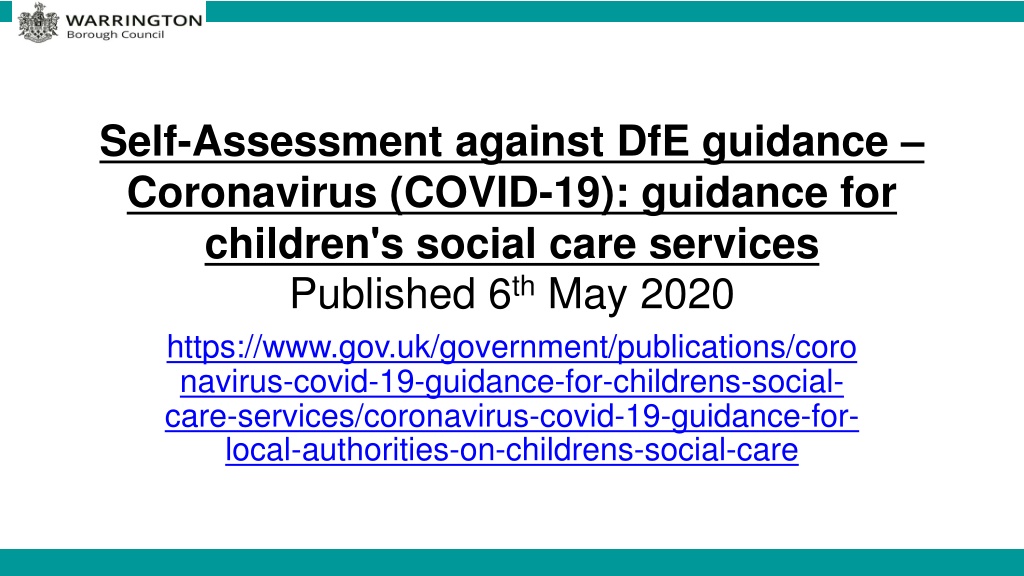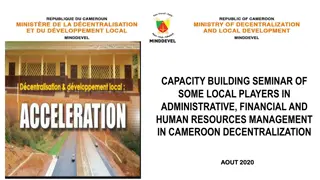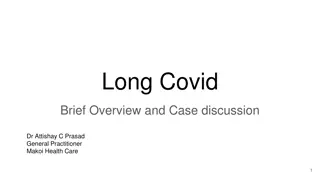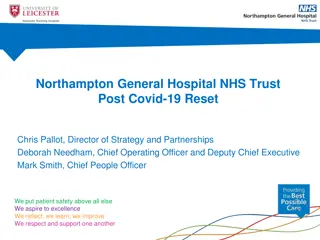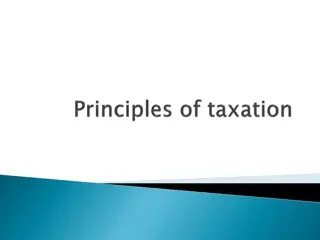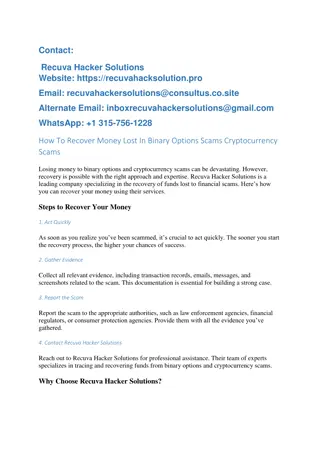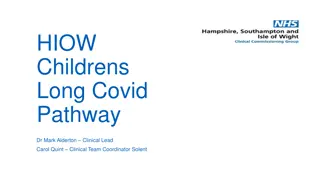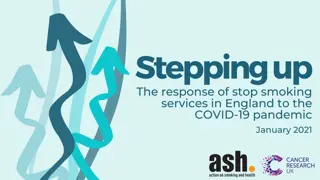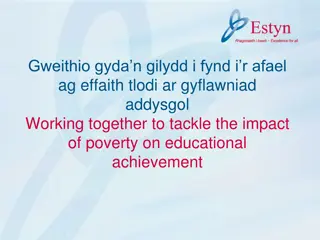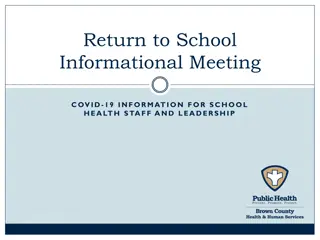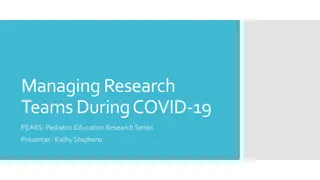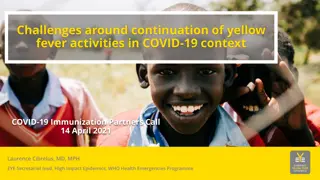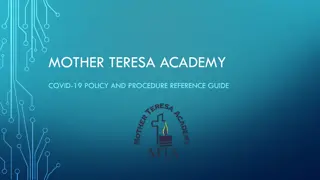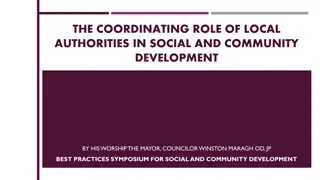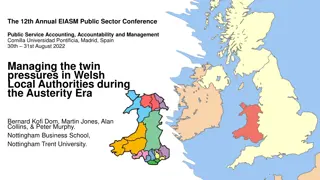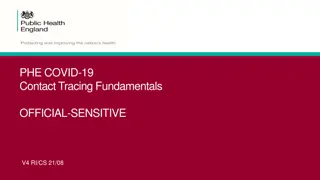Prioritizing Activities in Local Authorities During COVID-19
Local authorities in Warrington are adapting their practices to ensure essential services for children and families during the COVID-19 pandemic. They have developed risk assessment tools, opened new facilities like the Children's Home at St. Katherine's Close, and established the Edge of Care Outreach Hub to support vulnerable adolescents. Safeguarding partnerships and domestic abuse steering groups are collaborating to provide necessary support and services, maintaining communication through strategic conference calls. In these challenging times, the focus remains on child-centered, risk-based decision-making, and partnership with families to safeguard children effectively.
Download Presentation

Please find below an Image/Link to download the presentation.
The content on the website is provided AS IS for your information and personal use only. It may not be sold, licensed, or shared on other websites without obtaining consent from the author. Download presentation by click this link. If you encounter any issues during the download, it is possible that the publisher has removed the file from their server.
E N D
Presentation Transcript
Self-Assessment against DfE guidance Coronavirus (COVID-19): guidance for children's social care services Published 6thMay 2020 https://www.gov.uk/government/publications/coro navirus-covid-19-guidance-for-childrens-social- care-services/coronavirus-covid-19-guidance-for- local-authorities-on-childrens-social-care
How should local authorities prioritise activity under the current pressure? Warrington: We started to explore and develop all areas of our practice. We developed a risk assessment and decision making tool to ensure that those children and families that need to be seen are seen. Local authorities know the needs of their children and families best, and, in line with normal practice, will be able to make sensible, child-centred, risk-based judgements about where to focus their efforts. As outlined in Working Together to Safeguard Children, this approach means keeping the child in focus and working in partnership with them and their families. The principles set out above should guide local decision making in these circumstances. The first area of our service that was considered was our residential homes. The service has adapted to fit the needs of our wider population of children and families. We have opened a new Children s Home at St Katherine's close and this is being registered with OFSTED. We identified the potential for increased pressures in relation to adolescents. In response the Families First Team and Early Help Service have joined together to offer an Edge of Care Outreach Hub (more information on slide 4) which will be available during the Covid-19 Pandemic.
Warrington Safeguarding Partnership During covid restrictions the WSP has held weekly strategic Partnership conference calls to support and update each of the core partners. Additionally there have been fortnightly Conference calls with the Impact and Quality Assurance Groups including wider partners across Warrington. These meetings have included the Lay Member and Independent Scrutiny Lead who have provided High Support and High Challenge to all partners in relation to their responses to Covid and core safeguarding business. Domestic abuse Steering Group The new Domestic Abuse Steering Group has held monthly conference calls to support and update each of the partners and has developed a strategic response to Covid including increased Refuge capacity and a media and awareness raising campaign. Refuge and IDVA services have continued to operate and provide support to victims. The Domestic Abuse Lead has had weekly conference calls with Pan-Cheshire colleagues & Cheshire Police DA leads ensuring a Pan- Cheshire response and additional fortnightly conference calls with the Cheshire PCC. Cheshire Police and Pan-Cheshire DA leads are providing a weekly Q&A session on social media to provide additional access and support to victims of Domestic abuse.
Warrington: The Edge of Care Hub opened in mid April in response to potential increased risks for adolescents during the COVID-19 pandemic . A small team of Families First and Youth Workers undertake support to children in need of immediate edge of care support.. Additionally, children recognised through the Contextual Safeguarding Operational Group as being vulnerable and in need of high levels of support also can access support through the Hub. How should local authorities prioritise activity under the current pressure? (Continued) The Hub is currently (22/05/2020) working with 11 young people. Five young people are accessing the service more than twice a week. All of these children have remained within their home or foster placement and are receiving a range of interventions including, CSE, healthy relationships, self-esteem and confidence building. In just over a month, the outreach work the Hub has produced significant impacts and outcomes for young people. It has provided an emotional and physical safe space for the young people to discuss and work through issues with youth workers. A young person working with the Hub: I found it better to talk about what s going on in my mind and feel heard here .I have a better understanding to reasons why I make my decisions and what my triggers are. I have not gone missing since working with you. I did have a wobble for one day but that when the centre was closed but I was not missing from home. I feel supported and never judged. I feel valued.
Should social workers change how they visit children and families? We expect local authorities and social workers to make judgements about visiting which balance considerations about: risks to children and young people risks to families risks to the workforce Warrington: The guidance offers options to complete alternative visiting methods but does not set out what this might be. In situations where families are to be seen PHE guidance is to be followed to minimise the spread of infection. Our risk assessment and tracking of families gives guidance on use of PPE to ensure children are safely seen when needed. We have guidance on virtual visits and social workers are given permission to be creative in how they engage children. Where is it safe to do so children will continue to be seen face to face.
Do childrens social care staff need to use personal protective equipment (PPE) for coronavirus (COVID-19)? Prior to undertaking a visit, the social worker, personal adviser or care worker should attempt to ascertain whether any member of the household is suffering from symptoms of coronavirus (COVID-19). Initial risk assessment, where possible should take place by telephone. Ultimately, where staff consider there is a risk to themselves or the individuals they are caring for, they should wear a fluid repellent surgical mask with or without eye protection, as determined by the individual staff member and in line with Public Health England guidance. Warrington: PHE guidance is followed and our guidance is checked and verified by our public health colleagues. Our risk assessment flow chart details the actions to be taken when it is deemed that a face to face visits is the only option. At which point this will be raised with the manager and agreement sought to make use of PPE.
What happens if families refuse entry to social workers, including if they are self-isolating? Children and families may feel anxious about infection risks. Where this anxiety is present and families are reluctant to engage with social workers, social workers should make contact with families and explain why it is essential that they have access to the home, or to see and speak to the children, to ensure they are safe and well. This need not always be a thorough, face-to-face visit, but should be sufficient to reassure the social worker that the child is not currently at risk of harm and that their welfare is safeguarded. There may, of course, be other reasons why families may refuse access and where they do and there is a risk to the life of the child or a likelihood of immediate serious harm, local authorities should follow the immediate protection procedures set out in working together to safeguard children. Warrington : The guidance we have introduced encourages proportionate decision making. Regular audits are taking place to offer added scrutiny and ensure safe decisions continue to be made. Our social work teams continue to balance the risk associated with COVID19 with the risk of significant harm. Public Health advice to be sought about need to visit and response agreed case by case. This will be the same for S47 activity and we will need fulfil statutory duties to these children where clear safeguarding concerns. We will need agree which SW undertake visits.
Warrington - We have created a schools attendance and risk assessment feedback loop. This weekly process monitors attendance and supports the safeguarding of children as a multi-agency group. Social workers complete a risk assessment for all children as to whether they should be in school . Social worker s consider a number of factors in this assessment, including safety a home, health risks, the child s wellbeing and placement stability (for children in care). Children who are assessed as should be in school are encouraged to attend; if children do not attend, a a plan across the professional network is agreed. Should local authorities be encouraging vulnerable children to attend their educational setting? There is an expectation that vulnerable children who have a social worker will attend an educational setting, so long as they do not have underlying health conditions that put them at severe risk. In circumstances where a parent does not want to bring their child to an educational setting, and their child is considered vulnerable, the social worker and educational setting should explore the reasons for this directly with the parent. Where parents are concerned about the risk of a child contracting coronavirus (COVID-19), the educational setting or social worker should talk through these anxieties with the parent following the advice set out by Public Health England. The weekly information sharing process has supported multi-agency efforts to work with parents/carers to increase the number of children (with a social worker) in schools . In the week starting 20th April, 23% of children with a social worker at Warrington schools, attended at least once, this figure has increased to 29% (for the week beginning 11th May). Crucially, 74% of children assessed as should be in school attended Warrington schools (week beginning 11th May). 86% of children (with a social worker at Warrington schools) were seen or contacted by their school in week of 11thMay. Managers in Children s Social Care focus on the children identified as not seen/ contacted weekly by schools, to ensure they are safe and well. A weekly meeting take place between a group or managers in Children s Social Care and the Virtual School Head Teacher to discuss issues relating to schools and children s attendance, to work together to resolve.
Week Total number of contacts During the initial weeks of the COVID19 lockdown there was a dip in the number of contacts received by the MASH. These numbers steadily increased in the coming weeks and the numbers have now reached a similar to level to pre COVID19. 16th 22nd March 102 23 29th March 82 30th March 5th April 117 Our contact and referral data was monitored from the offset and discussed with partner agencies. 6th April 12th April 67 13th 19th April 100 20 26th April 114 27th April 3rd May 125 4th 10th May 125 11th 17th May 142
What support should local authorities be providing to children who have a social worker? Safeguarding and promoting the welfare of children remains of paramount importance. For many parents, carers and children, access to support, including the services offered by other safeguarding partners, educational settings or the third sector, can be invaluable in helping to keep children safe and families sufficiently supported. As far as possible, multi-agency support should continue, whilst being mindful of changes in how this is offered, for example, offering telephone or online support rather than face-to-face meetings where it is safe to do so. Local authorities should be conscious of reduced protective factors available to children and families and the increased stressors as a result of coronavirus (COVID-19) and try to ensure continuity and consistency of support where possible. Warrington: Multi agency meetings are continuing to ensure families are receiving the support they need. Social workers are creative in their approach to seeing children where they can t be seen face to face. Making use of direct work that can be completed virtually. The multi agency group continue to support families, we are seeing examples of schools visiting our most vulnerable children who are not in school, our edge of care team has worked closely with Early Help to provide an offer of support to those children on the edge of care. A Day in the Life of a Social Worker during COVID-19:
Should multi-agency child protection conferences go ahead? Child protection conferences and multi-agency front door assessments of referrals are particularly critical to protect vulnerable children. We recognise that there may be instances where multi-agency working will need to be done differently during this period, within the framework set out in law, and we encourage local authorities and safeguarding partners (including the police and health service) to make use of alternative technological solutions in the circumstances to ensure they are able to make timely decisions in the best interests of the child. Warrington: Child Protection conferences are completed virtually with minimum quorate of statutory agencies. Conference chairs will speak to parents and children (where possible) to ensure their contribution and understanding of the process and the issues. Partners will continue to provide written contributions prior to the conference call. Circle of change child protection plans will be produced electronically and be reviewed & progressed via virtual core groups.
Warrington Caldicott Guardian & Information governance team are available to offer advice - What barriers are there to sharing information where there are concerns about a child? Any practitioner working with a child can share relevant personal information lawfully, including without consent where necessary, if it is to keep a child safe from harm or to protect their physical, mental and emotional well- being. The General Data Protection Regulation (GDPR) and the Data Protection Act 2018 do not prevent, or limit, the sharing of information for the purposes of keeping children safe. Practitioners are reminded that if they are concerned about a safeguarding data sharing matter, they are advised to seek advice from legal representatives where appropriate, other practitioners, or the information governance lead, in line with guidance on information sharing for practitioners providing safeguarding services. Requests for Information The IG team is monitoring the guidance from the ICO on how organisations deal with requests for information at this time. We have published a note from the SIRO and Data Protection Officer on winnie for all staff advising them on how the IG team can support all staff and how we can remain compliant with our statutory deadlines. The IG team have revised the wording for FOI requests. New templates with the wording for FOI s and SAR s have been circulated so the reps can implement those for both new and existing requests informing of potential delays. We are also aware that the main FOI mailbox in the council generates an automated message, we have arranged for this to be changed to provide further information to requestors and to advise them of the likelihood of delays. Supporting staff The IG team are currently based out of home but are fully contactable via lync, email and telephone. We are there to support any queries relating to information governance as usual. We will continue to work with the FOI reps in each department as we understand that there needs to be added flexibility around resources so if we need to arrange for information to be published online to direct requestors to or to review and triage requests if we see an increase, we can look at how we can get involved to assist. For any matter that are not clear, we have external support networks with other local authorities, NHS colleagues and also with the ICO so will use these where required as well
What should we do if one of our childrens homes does not have enough members of staff to operate? You should continue to notify Ofsted if your home is going to close. Where you have an immediate or impending staffing shortage, which may lead to the closure of your home, you should discuss that as a matter of urgency with the relevant placing local authorities. You should also notify Ofsted, who may share this information with DfE. Warrington: This was a priority area for us, in the early stages of the pandemic the work that normally take place in our Families First service was reviewed and a core team of staff have been moved across the residential service to address immediate staffing issues. There is also a contingency plan in place whereby there is a list of people from across the Children s Services who are willing to support the children s homes. This information was gathered from a service wide survey.
Warrington has opened St Katherines as an emergency home for children impacted either by Covid-19 or by lack of placements. The process of registering the home has started, Ofsted (Regulatory inspection manager for the North West) have been appraised of this by our Head of Service for children in care and care leavers. If placements in children s homes or foster care cannot be found, is it acceptable to use unregulated provision? Local authorities will need to ensure that the accommodation provided to children meets their needs to the best of their ability given the current context. Placements in independent and semi- independent provision can be the right choice for some older children, acting as a stepping-stone to adult life, and we expect these to continue. Local authorities should continue to do all they can to promote the welfare of looked after children and ensure their safety. To date, four children have been placed with this provision. Two of the children have now returned to their the families and one has returned to their original placement.
Care leavers How should local authorities meet their responsibilities to care leavers? Local authorities must continue to meet their statutory responsibilities towards care leavers, such as providing personal advisers, or preparing and reviewing pathway plans. Personal advisers should proactively reach out to care leavers during the pandemic. Warrington: We are adapting the ways we are supporting our care leavers We are in touch with most of our care leavers on a weekly basis. We have purchased phone credit for care leavers who have needed it, this ensures their personal advisors are able to keep in regular contact. Some of our care leavers have had to return home from University. If needed, we will continue to pay one bedroom rate to support this. We have increased our maintenance payments by 20 a week and have provided food bank vouchers and financial support for food, gas and electric when needed too. We still pay incentive to those young people who have been unable to attend college/work due to Covid-19. However, we understand that local authorities may have to adapt the way they support care leavers during this period. We encourage local authorities to support and protect young people in effective ways. As always, local authorities should carefully assess care leavers needs and prioritise support to the most vulnerable.
Are personal advisers still expected and able to visit care leavers? Warrington: Personal advisors will follow the same guidance as children s social workers, where it is necessary to see one of care leavers to be assured of their being a face to face visit will be attempted. In the event that the care leaver is displaying symptoms consideration will be given to use of PPE. To minimise the need for face-to-face contact, we encourage personal advisers to keep in touch with young people through technology such as phone or video. However, face-to-face visits will still be necessary to provide the right help to some young people. Personal advisers should carefully assess what is the right level and frequency of contact with each care leaver, taking into account each young person s particular circumstances and levels of vulnerability. They should always consider the individual wishes and feelings of care leavers. If it is not possible to provide the right level of support to a care leaver remotely, personal advisers and their manager should carefully assess the level of risk and prioritise cases where face-to-face contact is unavoidable. Personal advisors and their managers will use to discretion to determine whether it is safe to complete virtual visits. Decisions will also be made in conjunction with our care leavers. Where face-to-face work is necessary, personal advisers should take account of Public Health England (PHE) advice on social distancing and minimising the spread of infection to protect themselves and the care leavers they are visiting.
What support is available to promote the mental health of looked-after children? Warrington: our children continue to be supported by their social workers. The increased use of different methods of communication has offering our children the opportunity to communicate their feelings in the ways that they feel most comfortable with. Local authorities as corporate parents have a duty to safeguard and promote the welfare of the children they look after including their physical, emotional and mental health. Local authorities and their health partners must work together during this time to ensure that the health needs of looked-after children continue to be met. There will be particular issues arising from coronavirus (COVID-19) that will affect looked-after children e.g. changes to contact with birth families. Local authorities should be alert to these issues and the impact they may have on looked-after children s mental health and wellbeing. Local authorities should continue to encourage looked-after children to speak to their social worker, carer or other trusted adult. The difficult decision has been made to cease face to face family to ensure they safety of our children and foster carers. In response to this social workers have used innovative methods to limit the impact of this. For example, one social worker used recording of a parent singing lullabies and blankets with their scent on to recreate the sensory environment for a baby who could not have face to face contact with their parents. See also Week in the life of a COVID19 Social worker .
What about court orders related to contact for children in care? We expect that contact between children in care and their birth relatives will continue. It is essential for children and families to remain in touch at this difficult time, and for many children, the consequences of not seeing relatives would be traumatising. Warrington: the decision was made to cease face to face family time to ensure the safety of our children and families. Family time is taking place virtually through What s App, Skype and via telephone. This decision will be continually reviewed in line with government guidance. Contact arrangements should therefore be assessed on a case by case basis taking into account a range of factors, including the government s social distancing guidance and the needs of the child . We expect the spirit of any court-ordered contact in relation to children in care to be maintained and will look to social workers to determine how best to support those valuable family interactions based on the circumstances of each case.
Fostering: What happens to foster children if foster carers are self-isolating or become ill? We recognise the importance of maintaining a permanent stable setting for children wherever possible. In most cases, we expect that children will remain with their foster parents in line with the social distancing guidance issued by the government. Warrington: the same rules will apply to our children in foster care as apply to all other families. Where there is a need of a household member to self-isolate all members of the household will self-isolate in line with government guidance. Where a foster carer is hospitalised, the needs of the child would be reviewed on a case by case basis.
If a foster carer is in a vulnerable group, should the foster child continue to attend their educational setting? Looked-after children and young people are expected to attend provision, unless their social worker, together with parents or carers where appropriate, are of the view that they are at less risk at home or in their placement, for example, due to underlying health conditions. Warrington: our children in care would not be expected to attend school expect in situations of placement instability. In these situations the needs of the child would be assessed on a case by case basis. We have weekly meetings with the virtual head to support our links between children and schools. We appreciate that decisions on attendance will likely be based on finely balanced discussions between the education provider, the foster carer, and others, including parents where appropriate, social workers, local authorities, and other relevant professionals where applicable.
We might need to recruit and approve more foster carers in the short term. What is being done to change the regulations related to fostering panels? We recognise that fostering services will want to bring in more emergency foster carers to help build capacity within their services in case of additional demand. We would encourage them to do this. Whilst they will want to ensure that assessments and approvals are thorough and comply with regulations, we do not want this to be unnecessarily delayed. Under Regulation 24 of the Fostering Services (England) Regulations 2011, there is already sufficient flexibility for fostering services to convene remote panels. Warrington: we continue to advertise through Foster4 (our regional fostering collaboration) and recruitment of foster carers continues. We currently do not have the need to recruit carers in the short term as a consequence of the pandemic. In Warrington we approve our carers as suitable to foster, with consideration given to matches made in line with the foster carers skills set. This has not necessitated the need to change approval for our carers in response to the pandemic. Due to the complexities of conducting fostering panel via skype and the wish to maintain independence of consideration of carers and applicants presented to fostering panel we have decided to continue with fostering panels but also to employ the amendments to regulation 24 fostering regulations England under COVID-19 guidance dated April 2020 a panel can now take place with an independent chair, social worker independent of the service and one other independent person. In order to help speed up the process in light of increasing demand and where places are required more urgently, the Fostering Services (England) Regulations 2011 have been amended to minimise any delays
Warrington: Together for adoption for developed guidance to help us navigate through the process during the pandemic. The key principles: All transitions to be considered and agreed on an individual basis To adhere to government guidance re Covid 19 Children to move into their adoptive families as promptly and as safely as possible For all parties to be in agreement with the process For the concerns of all parties to be taken into account For new families to feel well supported For the service to be able to respond to changing needs in early placement support as needed in a safe way Good safe child centred practice is key to the long term stability of placements. Should we stop all introductory meetings for children with new adopted parents? Whilst we understand that these will be challenging in current circumstances there should not be a blanket ban. There needs to be a case by case, risk- based decision. Regional Adoption Agencies should consider utilising communication technology to continue with the adoption process. We accept that for some children introductory meetings may have to be postponed, but we welcome creativity to prioritise permanent placements for children in line with their best interests. Each case is assessed and a risk assessment completed to understand impact of any delay on the child and the risks associated with COVID19. Our Head of Service for children in care and care leavers also reviews each adoption case.
During this challenging period, can we move to stage two of the adopter assessment process without having completed the health assessment or having disclosure and barring service (DBS) clearance? We expect adoption agencies to take a common sense, risk-based approach during this unprecedented period. If prospective adopters would like to proceed to stage 2 and local authorities are happy to proceed without the health assessment and/or DBS clearance, they should do so as long as these checks are completed before the end of stage 2. Warrington: prospective adopters to complete a self declaration medical form, which Designated Nurses Safeguarding Children, review against their electronic GP medicals. The medical advisor will complete a summary from the available information. A face to face GP assessment will be completed after Covid 19 has subsided. Whilst we can progress to stage 2, on a self declaration, (plus adopters wont have recourse to the IRM, should they not be deemed suitable to adopt due a medical reason) the above process will ensure assessment can move to approval, and saves a potential waste of resources on assessments that should not progress for medical reasons.
